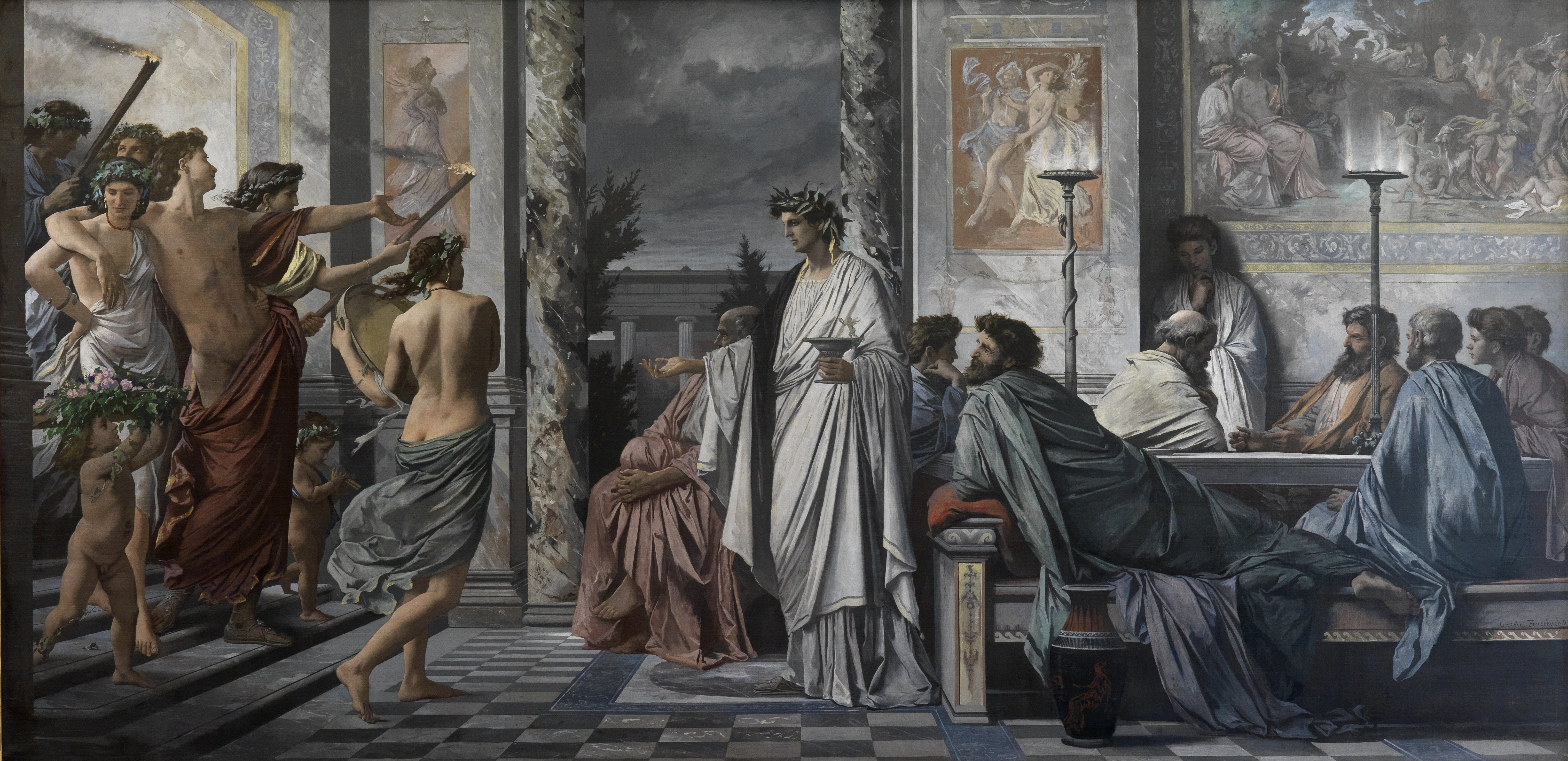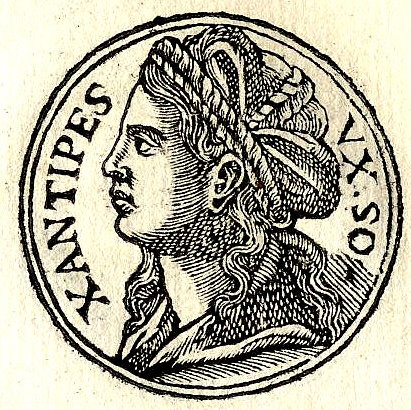|
Halcyon (dialogue)
''Halcyon'' ( grc-gre, Ἀλκυών) is a short dialogue attributed in the manuscripts to both Plato and Lucian, but the work is not by either writer. Favorinus, writing in the early second century, attributes it to a certain Leon, as did Nicias of Nicaea. Content In the dialogue, Socrates relates to Chaerephon the ancient myth of Halcyon, a woman who was transformed by the gods into a bird to be able to search the seas for her husband Ceyx, who was lost at sea. Skeptical of the account, Chaerephon questions the possibility that humans can be transformed into birds. In response, Socrates cautions that there are many amazing things unknown or at least not fully understood by humans, and advocates epistemological humility for mortals in light of the gods' abilities or, more generally, in light of what humans do not know. For comparison, Socrates refers to a bad storm that recently took place and was immediately followed by a sudden calm. Such a sudden transformation is all at o ... [...More Info...] [...Related Items...] OR: [Wikipedia] [Google] [Baidu] |
John Madison Cooper
John Madison Cooper (November 29, 1939 – August 8, 2022) was an American philosopher who was the Emeritus Henry Putnam University Professor of Philosophy at Princeton University and an expert on ancient philosophy. Education and career Cooper earned his Ph.D. at Harvard University in 1967 and taught there until 1971, when he accepted a tenured position in philosophy at the University of Pittsburgh, where he taught until he moved to Princeton in 1981. He was elected a Fellow of the American Academy of Arts & Sciences in 2001. In 2011, Cooper delivered the John Locke Lectures at Oxford University, and in 2012, he delivered the Tanner Lectures on Human Values at Stanford University. Philosophical work He is the editor of the Hackett edition of the complete works of Plato, as well as author of ''Pursuits of Wisdom: Six Ways of Life in Ancient Philosophy from Socrates to Plotinus'' and a number of other books on ancient Greek philosophy. Selected books * ''Reason and Hum ... [...More Info...] [...Related Items...] OR: [Wikipedia] [Google] [Baidu] |
Stephanus Pagination
Stephanus pagination is a system of reference and organization used in modern editions and translations of Plato (and less famously, Plutarch) based on the three-volume 1578 edition''Platonis opera quae extant omnia'' edidit Henricus Stephanus, Genevae, 1578. of Plato's complete works translated by Joannes Serranus (Jean de Serres) and published by Henricus Stephanus (Henri Estienne) in Geneva. Overview In the case of Plato's works, Stephanus pagination first divides the works into numbers that are the page numbers of each of the Stephanus edition's three volumes, and each such page and page number is further subdivided into lettered sections which correspond to parallel Greek/Latin translated passages on a given page, mostly commonly a, b, c, d, and e. This system is used in modern scholarship to cite Plato. For Plato's works, unique coordinates for a passage can therefore be given with three pieces of information: the work's name, the (Stephanus) page number, and the letter deno ... [...More Info...] [...Related Items...] OR: [Wikipedia] [Google] [Baidu] |
Thrasyllus Of Mendes
Thrasyllus of Mendes (; grc-gre, Θράσυλλος ), also known as Thrasyllus of AlexandriaLevick, ''Tiberius: The Politician'', p. 7 and by his Roman name Tiberius Claudius ThrasyllusLevick, ''Tiberius: The Goat '', p. 137 (fl. second half of the 1st century BC and first half of the 1st century – died 36,Holden, ''A History of Horoscopic Astrology'', p. 26), was an Egyptian grammarian and literary commentator. Thrasyllus was an astrologer and a personal friend of the Roman emperor Tiberius, as mentioned in the ''Annals'' by Tacitus and ''The Twelve Caesars'' by Suetonius. Background Thrasyllus was an Egyptian from unknown origins, as his family and ancestors were contemporaries that lived under the rule of the Ptolemaic Kingdom. He originally was either from Mendes or Alexandria. Thrasyllus is often mentioned in various secondary sources as coming from Alexandria (as mentioned in the ''Oxford Classical Dictionary'') as no primary source confirms his origins. Tiberiu ... [...More Info...] [...Related Items...] OR: [Wikipedia] [Google] [Baidu] |
Symposium (Plato)
The ''Symposium'' ( grc, Συμπόσιον, ) is a philosophical text by Plato, dated . It depicts a friendly contest of extemporaneous speeches given by a group of notable men attending a banquet. The men include the philosopher Socrates, the general and political figure Alcibiades, and the comic playwright Aristophanes. The speeches are to be given in praise of Eros, the god of love and desire. In the ''Symposium'', Eros is recognized both as erotic love and as a phenomenon capable of inspiring courage, valor, great deeds and works, and vanquishing man's natural fear of death. It is seen as transcending its earthly origins and attaining spiritual heights. This extraordinary elevation of the concept of love raises a question of whether some of the most extreme extents of meaning might be intended as humor or farce. ''Eros'' is almost always translated as "love", and the English word has its own varieties and ambiguities that provide additional challenges to the effort to under ... [...More Info...] [...Related Items...] OR: [Wikipedia] [Google] [Baidu] |
Phalerum
Phalerum or Phaleron ( ''()'', ; ''()'', ) was a port of Ancient Athens, 5 km southwest of the Acropolis of Athens, on a bay of the Saronic Gulf. The bay is also referred to as "Bay of Phalerum" ( el, Όρμος Φαλήρου '').'' The area of Phalerum is now occupied by the towns Palaio Faliro, Kallithea, Moschato and Neo Faliro, all of which are part of the Athens agglomeration. Phalerum was the major port of Athens before Themistocles had the three rocky natural harbours by the promontory of Piraeus developed as alternative, from 491 BC. It was said that Menestheus set sail with his fleet to Troy from Phalerum, as so did Theseus when he sailed to Crete after the death of Androgeus. Recently, archaeologists have uncovered what appear to be traces of ancient Athens’s first port before the city’s naval and shipping centre was moved to Piraeus. The site, some 350 m from the modern coastline, contained pottery, tracks from the carts that would have served the port, an ... [...More Info...] [...Related Items...] OR: [Wikipedia] [Google] [Baidu] |
Myrto
Myrto (; el, Μυρτώ; fl. 5th century BC) was, according to some accounts, a wife of Socrates. Sources The original source for the claim that she was Socrates' wife appears to have been a work by Aristotle called ''On Being Well-Born'',Athenaeus, xiii. 555D–556APlutarch, ''Aristides'', xxvii. 3–4Diogenes Laërtius, ii. 26 although Plutarch expresses doubt that the work is genuine. She was apparently the daughter, or, more probably, the granddaughter of Aristides. A different account of Xanthippe and Myrto is given in Aristoxenus's ''Life of Socrates'' written in the latter part of the fourth century BC that Aristoxenus asserts is based on first-person accounts by his father. This claims that Myrto was his legitimate wife and Xanthippe his mistress, whose child became legitimate. Although Diogenes Laërtius describes Myrto as Socrates' second wife living alongside Xanthippe, Myrto was presumably a common-law wife,Luis E. Navia (1985), ''Socrates, the man and his philosoph ... [...More Info...] [...Related Items...] OR: [Wikipedia] [Google] [Baidu] |
Xanthippe
Xanthippe (; , , ; 5th–4th century BCE) was an ancient Athenian, the wife of Socrates and mother of their three sons: Lamprocles, Sophroniscus, and Menexenus. She was likely much younger than Socrates, perhaps by as much as 40 years. Name Xanthippe means "yellow horse", from grc, ξανθός "blond" and "horse". Hers is one of many Greek personal names with a horse theme (cf. ''Philippos'' "Friend of Horses", ''Hippocrates'' "Horse-tamer", etc.). The ''hippos'' in an ancient Greek name often suggested aristocratic heritage. One additional reason for thinking Xanthippe's family was socially prominent was that her eldest son was named Lamprocles instead of "Sophroniscus" after Socrates' father Sophroniscus: the ancient Greek custom was to name one's first child after the more illustrious of the two grandfathers. Xanthippe's father is believed to have been named Lamprocles. If he was even more well-established in Athenian aristocracy than was Socrates' father, his name w ... [...More Info...] [...Related Items...] OR: [Wikipedia] [Google] [Baidu] |
Halcyon (genus)
''Halcyon'' () is a genus of the tree kingfishers, near passerine birds in the subfamily Halcyoninae. Taxonomy The genus ''Halcyon'' was introduced by the English naturalist and artist William John Swainson in 1821. He named the type species as the woodland kingfisher (''Halcyon senegalensis''). "Halcyon" is a name for a bird in Greek legend generally associated with the kingfisher. There was an ancient belief that the bird nested on the sea, which it calmed in order to lay its eggs on a floating nest. Two weeks of calm weather were therefore expected around the winter solstice. This myth leads to the use of halcyon as a term for peace or calmness. The genus contains 12 species: * However, other sources, including Fry & Fry, lump the genera ''Pelargopsis'', '' Syma'' and '' Todirhamphus'' into ''Halcyon'' to make a much larger grouping. Geographic distribution The genus ''Halcyon'' in the current sense consists mainly of species resident in sub-Saharan Africa, with a couple ... [...More Info...] [...Related Items...] OR: [Wikipedia] [Google] [Baidu] |
Plato
Plato ( ; grc-gre, Πλάτων ; 428/427 or 424/423 – 348/347 BC) was a Greek philosopher born in Athens during the Classical period in Ancient Greece. He founded the Platonist school of thought and the Academy, the first institution of higher learning on the European continent. Along with his teacher, Socrates, and his student, Aristotle, Plato is a central figure in the history of Ancient Greek philosophy and the Western and Middle Eastern philosophies descended from it. He has also shaped religion and spirituality. The so-called neoplatonism of his interpreter Plotinus greatly influenced both Christianity (through Church Fathers such as Augustine) and Islamic philosophy (through e.g. Al-Farabi). In modern times, Friedrich Nietzsche diagnosed Western culture as growing in the shadow of Plato (famously calling Christianity "Platonism for the masses"), while Alfred North Whitehead famously said: "the safest general characterization of the European philosophical tra ... [...More Info...] [...Related Items...] OR: [Wikipedia] [Google] [Baidu] |
Alcyone
In Greek mythology, Alcyone or Halcyone (; grc, Ἀλκυόνη, Alkyónē derived from grc, ἀλκυών, alkyṓn, kingfisher, label=none) and Ceyx (; grc, Κήϋξ, Kḗÿx) were a wife and husband who incurred the wrath of the god Zeus. Mythology Alcyone was a Thessalian princess, the daughter of King Aeolus of Aeolia, either by Enarete or Aegiale. She was the sister of Salmoneus, Athamas, Sisyphus, Cretheus, Perieres, Deioneus, Magnes, Calyce, Canace, Pisidice and Perimede. Later on, Alcyone became the queen of Trachis after marrying King Ceyx. The latter was the son of Eosphorus (often translated as Lucifer). The couple were very happy together in Trachis. According to Pseudo-Apollodorus's account, this couple often sacrilegiously called each other "Zeus" and "Hera". This angered Zeus, so while Ceyx was at sea (in order to consult an oracle, according to Ovid), he killed Ceyx with a thunderbolt. Soon after, Morpheus, the god of dreams, disguised as Ceyx, ... [...More Info...] [...Related Items...] OR: [Wikipedia] [Google] [Baidu] |





.jpg)